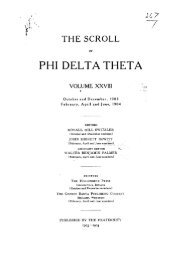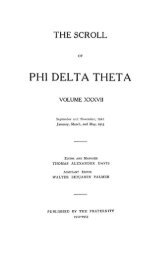1998 Volume 121 No 1–4 - Phi Delta Theta Scroll Archive
1998 Volume 121 No 1–4 - Phi Delta Theta Scroll Archive
1998 Volume 121 No 1–4 - Phi Delta Theta Scroll Archive
You also want an ePaper? Increase the reach of your titles
YUMPU automatically turns print PDFs into web optimized ePapers that Google loves.
[<br />
THE CARDINAL PRINCIPLES<br />
Learning through rectitude<br />
By Rev. David Turner, O.S.B.<br />
BEING RESPONSIBLE FOR A FEATURE<br />
article in a regularly published<br />
magazine or journal can have its<br />
problems. People who write regularly,<br />
especially those who do so for a living,<br />
will tell you, without pulling a punch<br />
that, success depends upon writing daily.<br />
This must be the case, they say, even<br />
when one is not "inspired." I am sure that<br />
many a Brother <strong>Phi</strong> has experienced<br />
looking at a blank sheet of paper when<br />
faced with a theme assignment in college<br />
and no inspirations are there. 1 always<br />
find that the writers are correct: stick<br />
with it and keep writing and the "material"<br />
will somehow emerge.<br />
The focus for this issue's column came<br />
in something of an inspirational way as 1<br />
was working with other faculty members<br />
all of whom are responsible for teaching<br />
the second required course in writing at<br />
our University: Research Writing in Content<br />
Fields. We teach sections that focus<br />
on the social sciences, the sciences (with<br />
separate sections for biology), and literature/humanities.<br />
Because of a number of<br />
news items that were being repeated on<br />
National Public Radio, our seminar began<br />
to focus on the issue of academic<br />
honesty. The trigger point was the resignation<br />
of a well-known writer with the<br />
Boston Globe because of plagiarism.<br />
It seemed to me that the issue of academic<br />
honesty might be a good one to<br />
examine within the framework of our<br />
cardinal principles since we really could<br />
tie two of them together in such a consideration:<br />
scholarship and moral rectitude.<br />
Scholarship is an important issue<br />
because we need to focus on questions<br />
that help us understand what is really<br />
involved in a process of "sound learning."<br />
Rectitude equally comes to the fore because<br />
academic honesty/dishonesty<br />
occupies an unusually larger place in<br />
today's collegiate world than may have<br />
been the case in the past.<br />
In my own syllabus for the Rhetoric<br />
102 course, you wUl find the following<br />
statement which, in similar words, will be<br />
found in the syllabi of other professors.<br />
"Academic Honesty: Plagiarism is a very<br />
serious issue and will result in a student<br />
failing this course." Harsh Perhaps.<br />
However, each professor also provides an<br />
appendix to the syllabus (with an acknowledged<br />
attribution to J.}. Weaver)<br />
trying to explain the issues involved.<br />
"How, may we ask, can<br />
anyone write anything<br />
that can be called original<br />
Are we to learn nothing<br />
from others"<br />
We recognize well that<br />
"students come to the university<br />
to learn, and this<br />
means acquiring ideas and<br />
exchanging opinions and<br />
evaluations with others.<br />
However, we must remember<br />
that no idea is genuinely<br />
learned by copying it down in the<br />
Father Tumer<br />
phrasing of someone else. Only when a<br />
writer has thought through an idea in<br />
terms of personal experiences can it be<br />
said that learning has taken place."<br />
In another part of the appendix, the<br />
claim is made that "plagiarism defeats the<br />
ends of education. If students were given<br />
credit for work that is not their own, then<br />
course grades would be meaningless. A<br />
college degree would become merely a<br />
sheet of paper, and the integrity of the<br />
university would be undermined."<br />
From an historical perspective as we<br />
look to December 26,<strong>1998</strong>, the actual<br />
anniversary date for our sesquicentennial,<br />
we might think back to the dreams<br />
our founders had when establishing <strong>Phi</strong><br />
<strong>Delta</strong> <strong>Theta</strong> and their dedication to the<br />
pursuit of truth in all branches of study.<br />
While I admit that times have changed<br />
and the body of knowledge has increased<br />
geometrically over the past 150 years, we<br />
nonetheless can review for ourselves the<br />
whole issue of mastery learning. Can we<br />
really "learn" Is it really possible, as<br />
Thomas Aquinas asked in the D'*" cen-<br />
tury, "for one man to teach another" In<br />
his marvelous little work "On the<br />
Teacher," Thomas tells us that no one can<br />
teach anyone else anything! <strong>No</strong>w with all<br />
the complaining I have heard over the<br />
years about "learning absolutely nothing<br />
from teacher X or teacher X' I still can go<br />
back to Thomas and recognize that his<br />
words were so true: one person can only<br />
lead another person from<br />
the unknown to the<br />
known. The individual<br />
must do the work of learning!<br />
A great deal has been<br />
written in the literature of<br />
educational psychology<br />
and the psychology of<br />
learning about how learning<br />
can take place in human<br />
beings. As Euclid told<br />
the king there was "no<br />
royal road to geometry," perhaps our<br />
own beginning can be to recognize what<br />
the psychologists have been telling us for<br />
so many years: it takes time and repetition!<br />
One must, as it was claimed in my<br />
first year algebra book in high school,<br />
"get each daily lesson and review it often."<br />
The old Romans had a saying.<br />
"The Cardinal Principles" appears as the<br />
first feature in the magazine. Its aim is to<br />
return the Fraternity to its founding principles—a<br />
goals of General Council President<br />
Chucic Poore. We thought it<br />
appropriate to asic Father David Turner,<br />
Minnesota '70, a former General Council<br />
member and chaplain of Benedictine<br />
University, to write a series of columns on<br />
living our principles. Fr. Turner welcomes<br />
comments from readers. Write him at<br />
Benedictine University, 5700 College<br />
Road, Lisle Illinois 60532-0900 or e-mail<br />
dturner@ben.edu.<br />
http://www.phidelt-ghq.com<br />
SUMMER <strong>1998</strong> THE SCROLL

















